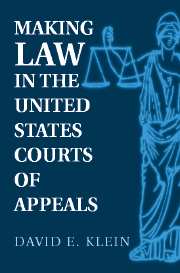Book contents
- Frontmatter
- Contents
- List of Tables
- Acknowledgments
- 1 Law Making in a Hierarchical Judicial System
- 2 Theory and Hypotheses
- 3 The Cases
- 4 Influences on Circuit Judges' Responses: Case Evidence
- 5 Influences on Circuit Judges' Responses: Interview Evidence
- 6 Anticipating the Supreme Court
- 7 Implications and Future Directions
- Appendixes
- References
- Index
1 - Law Making in a Hierarchical Judicial System
Published online by Cambridge University Press: 10 December 2009
- Frontmatter
- Contents
- List of Tables
- Acknowledgments
- 1 Law Making in a Hierarchical Judicial System
- 2 Theory and Hypotheses
- 3 The Cases
- 4 Influences on Circuit Judges' Responses: Case Evidence
- 5 Influences on Circuit Judges' Responses: Interview Evidence
- 6 Anticipating the Supreme Court
- 7 Implications and Future Directions
- Appendixes
- References
- Index
Summary
On June 10, 1996, the U.S. Supreme Court handed down its decision in the case of Whren v. United States. Whren and a co-defendant, accused of federal drug law violations, had been convicted in District Court and, after appealing to the U.S. Court of Appeals for the District of Columbia Circuit, had lost there too. At both courts they had requested that the drugs found in Whren's car be excluded from evidence at their trial, contending that the arresting police officers' purported basis for stopping them – a minor traffic infraction – was in fact a pretext, employed because the officers wished to search for drugs but had no probable cause to do so. Their argument now failed for a third time. According to a unanimous Supreme Court, “the District Court found that the officers had probable cause to believe that petitioners had violated the traffic code. That rendered the stop reasonable under the Fourth Amendment, the evidence thereby discovered admissible, and the upholding of the convictions by the Court of Appeals for the District of Columbia Circuit correct” (819).
When viewed as a single Supreme Court case or even a series of cases involving a single defendant, these events probably seem unremarkable. In reality, though, they constitute only the final chapter in a complex, intriguing legal saga involving numerous defendants and courts. The first chapter began eleven years earlier, on June 5, 1985.
Early that morning, two men driving along Interstate 95 in Florida were stopped by a trooper from the Highway Patrol.
- Type
- Chapter
- Information
- Publisher: Cambridge University PressPrint publication year: 2002



